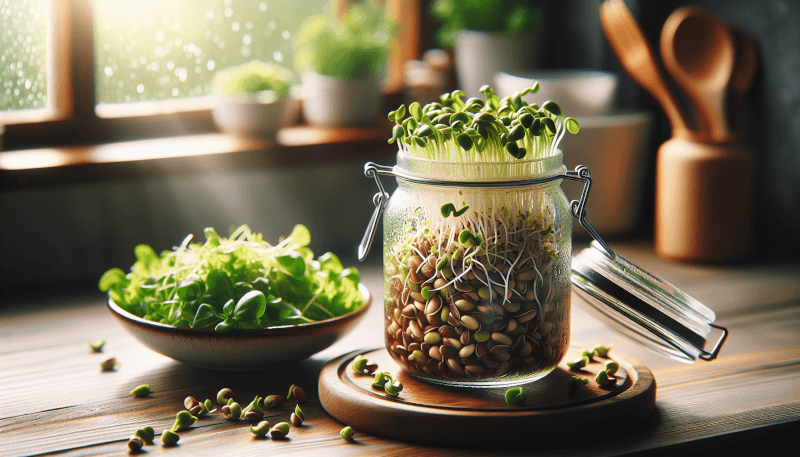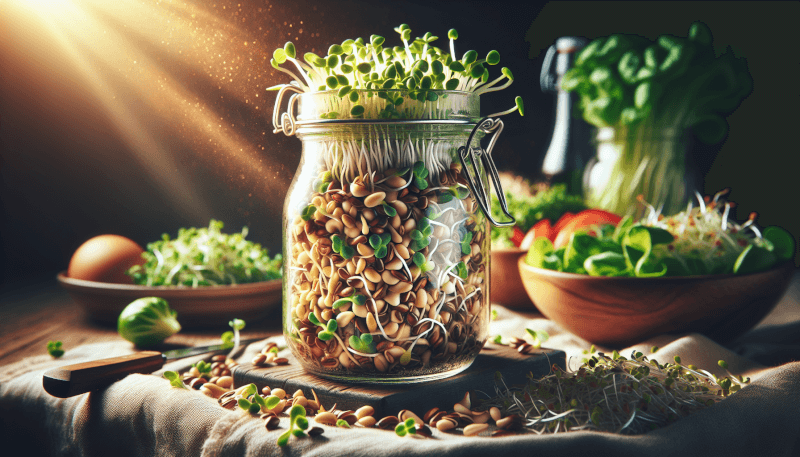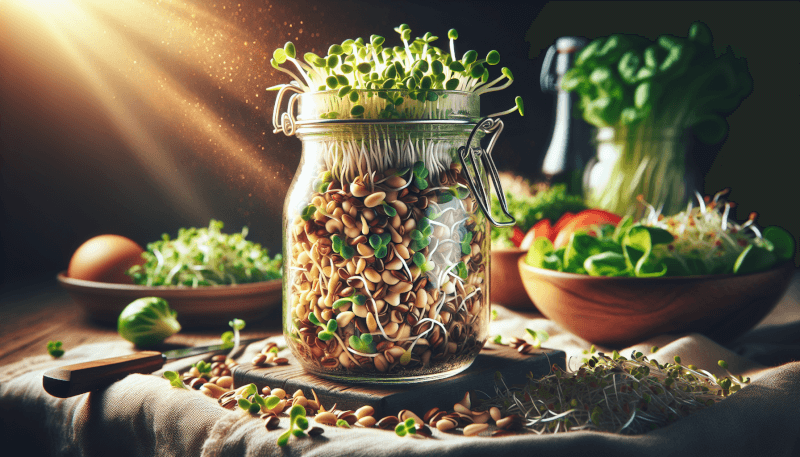If you’re looking to add a fresh and nutritious twist to your daily salads, then sprouting seeds might just be the answer. Sprouting seeds are tiny powerhouses bursting with flavor and health benefits, making them a perfect addition to any salad. Whether you’re a seasoned gardener or new to the world of sprouting, this article will guide you through the process of sprouting seeds for salads, ensuring that you have a bountiful supply of crunchy, nutrient-rich sprouts at your fingertips. So, grab your gardening gloves and get ready to embark on a delicious and rewarding journey of sprouting seeds for your salads.
Health Benefits of Sprouting Seeds
Nutritional Value of Sprouting Seeds
Sprouting seeds offer a wealth of nutritional benefits. When you sprout seeds, their nutrient content significantly increases. Sprouts are packed with essential vitamins, minerals, and enzymes that are beneficial for your overall health. They are an excellent source of fiber, protein, and antioxidants, making them a valuable addition to any diet.
Antioxidant Properties
One of the key health benefits of sprouting seeds is their antioxidant properties. Sprouts contain high levels of antioxidants, which help protect your body against damage caused by harmful free radicals. Antioxidants play a crucial role in reducing inflammation, boosting your immune system, and preventing chronic diseases like heart disease and cancer. Adding sprouts to your meals is a simple and effective way to enhance your antioxidant intake.
Digestive Health Benefits
Sprouting seeds can promote digestive health due to their high fiber content. Fiber helps regulate digestion, promote bowel regularity, and prevent constipation. Additionally, sprouts contain enzymes that aid in the digestion and absorption of nutrients. By incorporating sprouts into your diet, you can support a healthy digestive system and improve overall gut health.
Popular Types of Sprouting Seeds
Alfalfa Seeds
Alfalfa seeds are one of the most popular choices for sprouting. They have a mild, slightly nutty flavor and are rich in vitamins A, C, and K. Alfalfa sprouts also contain minerals such as calcium, iron, and magnesium. These tiny sprouts can add a crisp texture and freshness to salads, sandwiches, and wraps.
Broccoli Seeds
Broccoli seeds are another popular option for sprouting. They are packed with essential nutrients like vitamins A, C, and K, as well as minerals like potassium and iron. Broccoli sprouts have a slightly peppery taste, and their crunchy texture makes them a delicious addition to salads, stir-fries, and sandwiches. Moreover, these sprouts are known for their potential anti-cancer properties, making them a valuable addition to your diet.
Radish Seeds
Radish seeds offer a unique and spicy flavor when sprouted. They are loaded with vitamins E, C, and B6, as well as minerals such as potassium and calcium. Radish sprouts add a delightful kick to salads, wraps, and soups. Not only do they provide a burst of flavor, but they also contain compounds that may aid in digestion and support liver health.

Preparing Sprouting Seeds
Choosing Seeds
When selecting seeds for sprouting, it is crucial to choose high-quality, organic seeds that are specifically labeled for sprouting. Look for seeds that are free from chemicals, pesticides, and genetic modifications. It’s also essential to choose seeds that are fresh and within their expiration date for optimum sprouting success.
Soaking Seeds
Before sprouting, it is necessary to soak the seeds to activate the germination process. Soaking helps soften the outer layer of the seeds, allowing them to sprout more easily. Soak the seeds in a clean container filled with filtered water for the recommended time specified on the seed packaging. This step is essential for promoting healthy sprout growth.
Rinsing and Draining
To ensure proper sprouting, it is crucial to rinse and drain the soaked seeds regularly. Rinse the seeds with clean water two to three times a day to remove any excess starch or debris. After rinsing, allow the seeds to drain completely, ensuring that there is no standing water. Proper rinsing and draining prevent the growth of mold or bacteria and promote healthy sprout development.
Equipment for Sprouting Seeds
Sprouting Jars
Sprouting jars are a popular and convenient option for sprouting seeds. These jars are designed with a mesh lid or screen that allows for proper airflow, drainage, and rinsing. Simply soak your seeds, place them in the jar, and rinse them regularly as instructed. The mesh lid ensures proper ventilation while preventing any contamination.
Sprouting Trays
Sprouting trays are another excellent choice for sprouting seeds, especially for larger quantities. These trays are equipped with multiple layers, allowing you to sprout several varieties of seeds simultaneously. Trays typically have a perforated bottom that allows excess water to drain out while maintaining proper moisture levels for sprouting.
Sprouting Bags
For those who prefer a more portable and space-saving option, sprouting bags are a fantastic choice. These bags are made from breathable fabric and feature a drawstring closure at the top. Simply soak your seeds, place them in the bag, and hang it in a well-ventilated area. The bag allows for proper airflow while preventing contamination.

Methods of Sprouting Seeds
Jar Method
The jar method is one of the simplest ways to sprout seeds. Start by soaking your chosen seeds in a jar filled with filtered water. After the recommended soaking time, drain the water and rinse the seeds. Fit the jar with a mesh lid or cheesecloth secured with a rubber band to allow for proper ventilation. Rinse the seeds two to three times a day, ensuring they are thoroughly drained each time. Place the jar in a well-lit area, avoiding direct sunlight, and watch as your seeds sprout and grow.
Tray Method
The tray method is ideal for sprouting larger quantities of seeds. Begin by soaking your seeds and allowing them to drain. Place a thin layer of moist paper towels or seed-starting potting mix in a sprouting tray. Scatter the soaked seeds evenly over the surface, ensuring they are not overcrowded. Cover the tray with a lid or another tray to create a dark, humid environment. Remove the cover once the seeds have sprouted, and place the tray in a well-lit area. Make sure to water the sprouts regularly to maintain moisture levels.
Bag Method
The bag method is a portable option that requires minimal equipment. Start by soaking your seeds in a bowl of water for the recommended time. Once soaked, drain the seeds and transfer them to a clean sprouting bag. Gently close the bag, leaving some space for airflow. Hang the bag in a well-ventilated area, away from direct sunlight. Rinse the seeds two to three times a day by submerging the bag in water and gently agitating. After rinsing, allow excess water to drain out by hanging the bag again. Your sprouts will grow and thrive within the convenient bag setup.
Troubleshooting Sprouting Issues
Mold or Fungus Growth
If you notice mold or fungus growing on your sprouts, it is essential to take immediate action. Mold growth can be harmful to your health if ingested. To prevent mold, ensure proper rinsing and draining of your sprouts. Maintaining good hygiene practices, such as washing your hands before handling seeds and equipment, can also help prevent contamination. If mold does occur, discard the affected sprouts and clean your sprouting equipment thoroughly before starting a new batch.
Excessive Water Retention
Excessive water retention can lead to mushy sprouts and a higher risk of mold growth. If your sprouts are retaining too much water, ensure that you are rinsing them thoroughly and allowing them to drain completely after each rinse. Adjust your rinsing frequency or method if needed. Additionally, make sure your sprouting equipment has good ventilation and is not trapping excessive moisture. Proper water management is crucial for healthy sprouts.
Sprouts Not Growing
If your sprouts are not growing as expected, several factors could be influencing their growth. Ensure that your seeds are fresh, within their expiration date, and suitable for sprouting. Check that you are providing the right conditions for sprouting, including proper rinsing, draining, and ventilation. Additionally, environmental factors such as temperature and light exposure can affect sprout growth. Experiment with different methods and adjust environmental conditions to find the best approach for successful sprouting.

Harvesting and Storing Sprouts
When to Harvest
The ideal time to harvest your sprouts depends on the type of seeds you are sprouting. Most sprouts can be harvested when they have reached a length of approximately 1-2 inches. The specific instructions for each seed variety can be found on the packaging. To harvest, simply snip the sprouts just above the roots using clean scissors or a sharp knife. Harvesting at the right time ensures optimal flavor and texture.
Proper Storing Techniques
To extend the shelf life of your harvested sprouts, it is crucial to store them properly. After harvesting, gently rinse your sprouts to remove any remaining hulls or debris. Allow the sprouts to dry thoroughly before transferring them to a clean, airtight container lined with a paper towel. Place the container in the refrigerator, where they can stay fresh for up to a week. Remember to check the sprouts for any signs of spoilage before consumption.
Safety Precautions
While sprouts offer numerous health benefits, it is important to handle them safely to avoid any potential contamination risks. Always make sure to wash your hands thoroughly before handling seeds or sprouts to prevent the spread of bacteria. Additionally, clean and sanitize your sprouting equipment regularly to maintain good hygiene. If you have a weakened immune system or are pregnant, it is advisable to avoid consuming raw sprouts due to the risk of bacterial contamination.
Using Sprouting Seeds in Salads
Adding Crunch and Texture
One of the primary reasons people enjoy adding sprouting seeds to salads is for the unique crunch and texture they provide. The delicate yet firm texture of sprouts adds a pleasant contrast to the other ingredients in a salad. Whether you choose alfalfa, broccoli, or radish sprouts, they will elevate your salad and take it to a whole new level of freshness and crispiness.
Enhancing Nutritional Profile
Including sprouting seeds in your salads is an excellent way to boost the nutritional profile of your meal. Sprouts offer an array of vitamins, minerals, and antioxidants that can enhance the overall nutrient content of your salad. By incorporating sprouts, you are adding an extra layer of nourishment to your diet, supporting better health and well-being.
Flavor Combinations
Sprouts not only contribute to the texture and nutrition of salads, but they also add a delightful taste to the mix. The fresh, slightly grassy flavor of alfalfa sprouts pairs well with a variety of salad ingredients, such as cherry tomatoes, cucumber, and feta cheese. Broccoli sprouts, with their mild peppery taste, complement ingredients like avocado, red onion, and roasted nuts. Radish sprouts, known for their spicy kick, add an extra zing when combined with ingredients like carrots, bell peppers, and a tangy dressing. The flavor combinations are endless, allowing you to create unique and delicious salads with sprouting seeds.

Recipes with Sprouts
Sprout and Vegetable Salad
Ingredients:
- Mixed salad greens
- Sprouting seeds of your choice (e.g., alfalfa, broccoli, radish)
- Cucumber, sliced
- Cherry tomatoes, halved
- Avocado, sliced
- Red onion, thinly sliced
- Feta cheese, crumbled
- Lemon vinaigrette dressing
Instructions:
- In a large salad bowl, combine the mixed salad greens, sprouting seeds, cucumber, cherry tomatoes, avocado, red onion, and feta cheese.
- Drizzle with lemon vinaigrette dressing and toss until well combined.
- Serve immediately and enjoy a refreshing and nutritious sprout and vegetable salad.
Sprouted Lentil and Quinoa Salad
Ingredients:
- Sprouted lentils
- Cooked quinoa
- Bell peppers, diced
- Red cabbage, shredded
- Carrots, grated
- Fresh parsley, chopped
- Lemon juice
- Olive oil
- Salt and pepper to taste
Instructions:
- In a large mixing bowl, combine the sprouted lentils, cooked quinoa, bell peppers, red cabbage, carrots, and fresh parsley.
- In a small bowl, whisk together lemon juice, olive oil, salt, and pepper to make the dressing.
- Pour the dressing over the salad and toss until well coated.
- Allow the flavors to meld by refrigerating the salad for at least 30 minutes.
- Serve chilled and enjoy a protein-packed sprouted lentil and quinoa salad.
Asian Sesame Sprout Salad
Ingredients:
- Sprouting seeds of your choice (e.g., alfalfa, radish)
- Napa cabbage, thinly sliced
- Shredded carrots
- Green onions, sliced
- Red bell pepper, thinly sliced
- Toasted sesame seeds
- Sesame oil
- Rice vinegar
- Soy sauce
- Honey or maple syrup (optional)
Instructions:
- In a large salad bowl, combine the sprouting seeds, Napa cabbage, shredded carrots, green onions, and red bell pepper.
- In a small bowl, whisk together sesame oil, rice vinegar, soy sauce, and honey or maple syrup (if desired) to create the dressing.
- Pour the dressing over the salad and toss until well coated.
- Sprinkle toasted sesame seeds on top for added crunch and flavor.
- Serve and enjoy an Asian-inspired sesame sprout salad bursting with delicious flavors.
Precautions and Considerations
Seed Selection Precautions
When selecting sprouting seeds, it is crucial to be aware of any potential contamination risks. Ensure that the seeds you choose are intended for sprouting and are labeled as such. Avoid using seeds meant for planting or those that have undergone chemical treatments. It is also advisable to purchase organic seeds to minimize exposure to pesticides and other harmful chemicals.
Potential Contamination Risks
Sprouts, including sprouting seeds, can be susceptible to bacterial contamination, primarily if not handled and prepared properly. It is important to follow proper hygiene practices when washing, soaking, and handling sprouts. Thoroughly clean your sprouting equipment and containers to prevent the growth of harmful bacteria. If you have a compromised immune system or are pregnant, it is recommended to consult with a healthcare professional before consuming raw sprouts due to the potential risk of foodborne illness.
Allergy Concerns
While sprouts are generally safe to consume, some individuals may have allergies or sensitivities to specific sprouting seeds. Common allergens include legumes like lentils and soybeans. If you have known allergies, it is essential to be cautious when introducing new sprouts into your diet. Start with small quantities and monitor your body’s response. If you experience any adverse reactions, such as itching, swelling, or difficulty breathing, discontinue consumption and seek medical advice.
Sprouting seeds offer a myriad of health benefits, from enhancing nutrient intake to promoting digestive health. With a variety of popular sprouting seed options to choose from, including alfalfa, broccoli, and radish, you can easily incorporate these nutritional powerhouses into your meals. By following proper seed preparation techniques and using suitable sprouting equipment, you can successfully grow your own sprouts at home. Whether you use them to add crunch and texture to salads or experiment with mouthwatering recipes, sprouting seeds are a versatile and wholesome addition to any kitchen. Just remember to take necessary precautions in seed selection, handle your sprouts safely, and enjoy the numerous benefits of these tiny nutritional powerhouses.


